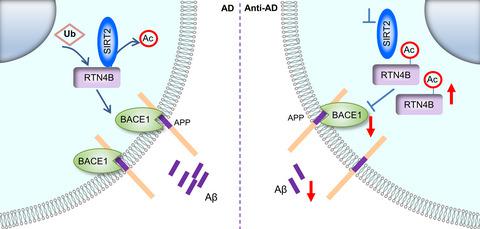当前位置:
X-MOL 学术
›
Aging Cell
›
论文详情
Our official English website, www.x-mol.net, welcomes your feedback! (Note: you will need to create a separate account there.)
RTN4B-mediated suppression of Sirtuin 2 activity ameliorates β-amyloid pathology and cognitive impairment in Alzheimer's disease mouse model.
Aging Cell ( IF 7.8 ) Pub Date : 2020-07-23 , DOI: 10.1111/acel.13194 Yan Wang 1 , Jing-Qi Yang 2 , Ting-Ting Hong 2 , Yuan-Hong Sun 3 , Hai-Li Huang 4 , Feng Chen 2 , Xiong-Jin Chen 2 , Hui-Yi Chen 2 , Shan-Shan Dong 1 , Li-Li Cui 2 , Tie-Lin Yang 1
Aging Cell ( IF 7.8 ) Pub Date : 2020-07-23 , DOI: 10.1111/acel.13194 Yan Wang 1 , Jing-Qi Yang 2 , Ting-Ting Hong 2 , Yuan-Hong Sun 3 , Hai-Li Huang 4 , Feng Chen 2 , Xiong-Jin Chen 2 , Hui-Yi Chen 2 , Shan-Shan Dong 1 , Li-Li Cui 2 , Tie-Lin Yang 1
Affiliation

|
Sirtuin 2 (SIRT2) is an NAD+ dependent deacetylase that is the most abundant sirtuin protein in the brain. Accumulating evidence revealed the role of SIRT2 in a wide range of biological processes and age‐related diseases. However, the pivotal mechanism of SIRT2 played in Alzheimer's disease (AD) remains unknown. Here, we report that pharmacological inactivation of SIRT2 has a beneficial effect in AD. The deacetylase inhibitor of SIRT2 rescued the cognitive impairment in amyloid precursor protein/presenilin 1 transgenic mouse (APP/PS1 mouse), and the BACE1 cleavage was weakened to reduce the β‐amyloid (Aβ) production in the hippocampus. Moreover, we firstly identified that Reticulon 4B (RTN4B) played a crucial role between SIRT2/BACE1 regulation in AD. RTN4B, as a deacetylation substrate for SIRT2, the deacetylation by SIRT2 drived the ubiquitination and degradation of RTN4B and then the disturbed RTN4B interacted with and influenced the expression of BACE1. When we overexpressed RTN4B in neurons of the hippocampus in the AD mouse model, the abnormal Aβ accumulation and cognitive impairment were ameliorated, consistent with the results of SIRT2 inhibition in vivo. Moreover, we showed that the regulatory effect of SIRT2 on BACE1 is dependent on RTN4B. When RTN4B was knocked down, the effects of SIRT2 inhibition on the BACE1 level, Aβ pathology, and AD‐liked behaviors were also blocked. Collectively, we provide evidence that SIRT2 may be a potential target for AD; the new found SIRT2/RTN4B/BACE1 pathological pathway is one of the critical mechanisms for the improvement of SIRT2 on AD.
中文翻译:

RTN4B 介导的 Sirtuin 2 活性抑制可改善阿尔茨海默病小鼠模型中的 β-淀粉样蛋白病理和认知障碍。
Sirtuin 2 (SIRT2) 是一种 NAD+ 依赖性脱乙酰酶,是大脑中含量最丰富的 Sirtuin 蛋白。越来越多的证据揭示了 SIRT2 在广泛的生物过程和与年龄相关的疾病中的作用。然而,SIRT2 在阿尔茨海默病 (AD) 中发挥的关键机制仍然未知。在这里,我们报告了 SIRT2 的药理学失活在 AD 中具有有益作用。SIRT2 的去乙酰化酶抑制剂挽救了淀粉样前体蛋白/早老素 1 转基因小鼠 ( APP / PS1)的认知障碍小鼠),并且 BACE1 裂解减弱以减少海马中 β-淀粉样蛋白 (Aβ) 的产生。此外,我们首先确定 Reticulon 4B (RTN4B) 在 AD 中的 SIRT2/BACE1 调节之间起关键作用。RTN4B 作为 SIRT2 的脱乙酰底物,SIRT2 的脱乙酰作用驱动了 RTN4B 的泛素化和降解,然后受干扰的 RTN4B 与 BACE1 相互作用并影响 BACE1 的表达。当我们在 AD 小鼠模型的海马神经元中过表达 RTN4B 时,异常 Aβ 积累和认知障碍得到改善,这与 体内 SIRT2 抑制的结果一致。此外,我们表明 SIRT2 对 BACE1 的调节作用依赖于 RTN4B。当 RTN4B 被敲低时,SIRT2 抑制对 BACE1 水平、Aβ 病理学、和 AD 喜欢的行为也被阻止。总的来说,我们提供证据表明 SIRT2 可能是 AD 的潜在靶点;新发现的SIRT2/RTN4B/BACE1病理通路是改善SIRT2对AD的关键机制之一。
更新日期:2020-07-23
中文翻译:

RTN4B 介导的 Sirtuin 2 活性抑制可改善阿尔茨海默病小鼠模型中的 β-淀粉样蛋白病理和认知障碍。
Sirtuin 2 (SIRT2) 是一种 NAD+ 依赖性脱乙酰酶,是大脑中含量最丰富的 Sirtuin 蛋白。越来越多的证据揭示了 SIRT2 在广泛的生物过程和与年龄相关的疾病中的作用。然而,SIRT2 在阿尔茨海默病 (AD) 中发挥的关键机制仍然未知。在这里,我们报告了 SIRT2 的药理学失活在 AD 中具有有益作用。SIRT2 的去乙酰化酶抑制剂挽救了淀粉样前体蛋白/早老素 1 转基因小鼠 ( APP / PS1)的认知障碍小鼠),并且 BACE1 裂解减弱以减少海马中 β-淀粉样蛋白 (Aβ) 的产生。此外,我们首先确定 Reticulon 4B (RTN4B) 在 AD 中的 SIRT2/BACE1 调节之间起关键作用。RTN4B 作为 SIRT2 的脱乙酰底物,SIRT2 的脱乙酰作用驱动了 RTN4B 的泛素化和降解,然后受干扰的 RTN4B 与 BACE1 相互作用并影响 BACE1 的表达。当我们在 AD 小鼠模型的海马神经元中过表达 RTN4B 时,异常 Aβ 积累和认知障碍得到改善,这与 体内 SIRT2 抑制的结果一致。此外,我们表明 SIRT2 对 BACE1 的调节作用依赖于 RTN4B。当 RTN4B 被敲低时,SIRT2 抑制对 BACE1 水平、Aβ 病理学、和 AD 喜欢的行为也被阻止。总的来说,我们提供证据表明 SIRT2 可能是 AD 的潜在靶点;新发现的SIRT2/RTN4B/BACE1病理通路是改善SIRT2对AD的关键机制之一。



























 京公网安备 11010802027423号
京公网安备 11010802027423号